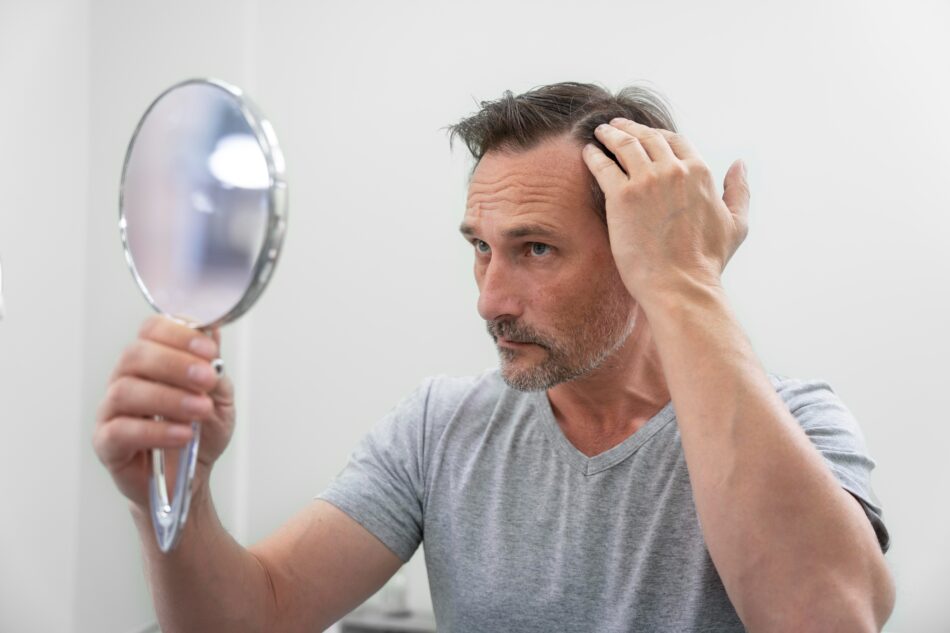What is testosterone?
Testosterone is a s*x hormone and chemical messenger responsible for many bodily functions in both men and women, including muscle and bone health, mood, male characteristics, reproduction, libido, cognitive function, and sperm production. It is also essential for the functioning of the ovaries in women. The testes in men and the ovaries in women both produce testosterone.
Proper hormonal balance is essential to optimize bodily functions and reduce the risk of bothersome or disabling symptoms.
Types of Testosterone
Hair loss is caused by high or low testosterone levels. However, a specific hormone is responsible. Here are the types of testosterone:
- Free Testosterone: It binds to testosterone receptors and does not bind to proteins in the body. Free testosterone is also absorbed by the body’s cells to carry out its essential functions.
- DHT: Dihydrotestosterone is produced by an enzyme called DHEA, which is common in women. This hormone is present in the prostate, hair, and skin. DHT binds to hair follicles, causing them to shrink. This binding leads to hair loss and hair thinning.
DHT comes from testosterone and plays an important role in male sexual health.
- DHT and Hair Loss: This testosterone is linked to one of the causes of baldness, in both men and women, as it is present in hair follicles. Hair loss is caused by the sensitivity of hair follicles to DHT and the general action of testosterone.
How does testosterone affect hair?
Hair loss caused by testosterone is usually due to excessive amounts of this active component. When DHT builds up in hair follicles, it inhibits the supply of essential nutrients and proteins. Initially, this causes testosterone-induced hair loss, as the follicles do not receive the necessary nutrients. In the long term, this disrupts the hair growth cycle. The resting phase of the cycle is prolonged, and new hairs become thinner. This eventually leads to bald spots and permanent hair loss. This phenomenon is also known as testosterone-DHT-induced hair loss. Since DHT is also present in women, it can even cause female pattern baldness.
Does testosterone cause hair loss?
Testosterone is essential for the overall health and well-being of the human body. In addition to contributing to sperm quality and male libido, it is involved in muscle growth and bone mass.
With age, testosterone levels decline in men, leading to decreased bone density, slower wound healing, and the appearance of wrinkles. With age, the production of essential hormones decreases, and a decrease in libido can occur. Low testosterone levels also contribute to some causes of hair loss.
The link between hair loss and testosterone has sparked much concern and debate. Surprisingly, hair loss can occur even with very low or high testosterone levels. Balancing this hormone is one way to maintain the health of your hair.
Does testosterone replacement therapy cause hair loss?
Healthcare professionals typically treat low testosterone levels with testosterone replacement therapy, also known as injections. However, TRT can cause side effects and, in some people, hair loss and thinning.
Hair loss is also relatively common among transgender men and non-binary people undergoing hormone replacement therapy. A 2021 study of 50 transgender men who had received masculinizing hormone therapy for an average of 10 years found that 63.3% experienced some degree of hair loss.
Understanding Testosterone-Related Hair Loss
Hair loss, particularly male pattern baldness, is often linked to dihydrotestosterone, a byproduct of testosterone. DHT binds to hair follicles, causing them to shrink and disrupting hair production. This process may be more rapid in people with a genetic predisposition to hair loss. However, several strategies can help control and reduce this side effect.
Topical Treatments
Minoxidil is a widely used topical treatment known for its effectiveness in preventing hair loss and promoting hair regrowth. Applied directly to the scalp, minoxidil stimulates hair follicles and increases blood circulation, which can prolong the hair growth phase.
Oral Medications
Finasteride is an oral medication that significantly reduces DHT levels, one of the main causes of hair loss in people taking testosterone. Although finasteride can be effective, it is important to be aware of potential side effects, such as decreased libido, erectile dysfunction, and mood swings.
Healthy Diet
A diet rich in vitamins, minerals, and essential fatty acids promotes hair growth and strength. Eggs, nuts, green leafy vegetables, and fish are excellent choices.
Regular Exercise
Physical activity improves blood circulation and provides essential nutrients to the hair follicles. Exercise also helps reduce stress, which can indirectly improve hair health.
Stress Management
High stress levels can contribute to hair loss. Techniques such as meditation, yoga, or regular relaxation exercises can help effectively manage stress.
How to prevent hair loss while taking testosterone?
Instead of stopping testosterone, oral medications like finasteride and dutasteride inhibit 5-alpha reductase activity to reduce DHT levels and thicken hair. Topical minoxidil can reverse hair follicle miniaturization and increase the supply of oxygen and essential nutrients to the scalp.
Oral minoxidil can be prescribed off-label to treat androgenetic alopecia and promote hair growth. Spironolactone, an oral antiandrogen medication, is commonly prescribed for women suffering from hair loss due to polycystic ovary syndrome. PRP injections are an excellent adjunct to hair loss treatment, as they promote hair thickening and regrowth.
Exercises for Hair Growth
After hair loss, it’s important to exercise to strengthen your hair. There are hair restoration routines that promote growth and minimize hair loss. Here are a few examples:
- Scalp massage
- Neck exercises
- Strength training
- Jogging
These exercises release endorphins, the happy hormones, which help you relax and control hair loss. Blood circulation to your scalp is optimal, and hair-specific routines ensure adequate nutrition.
Check out our other blog posts for more information on hair health. Easily schedule a call and speak to one of our specialists if you have any other questions or concerns about your hair.
Visit here : Royalpharmacart









